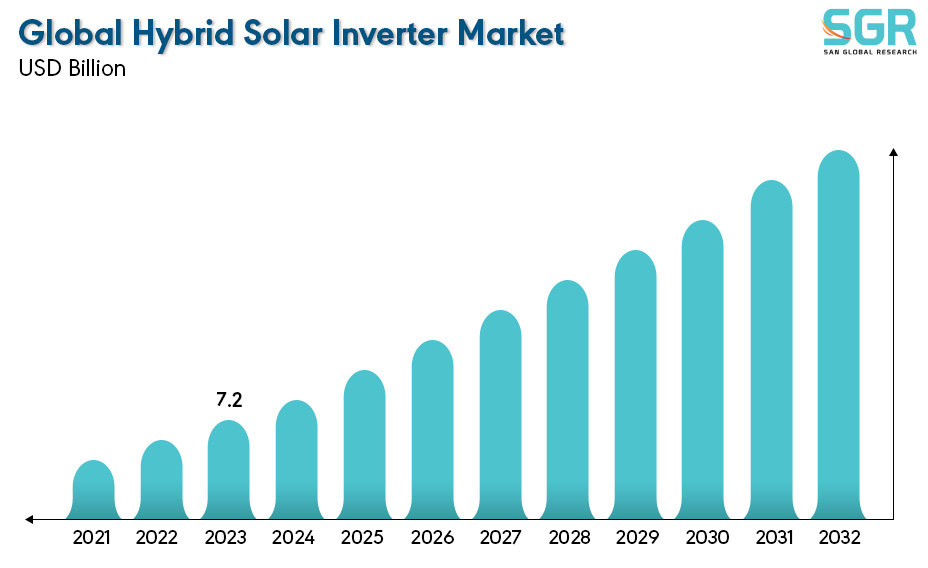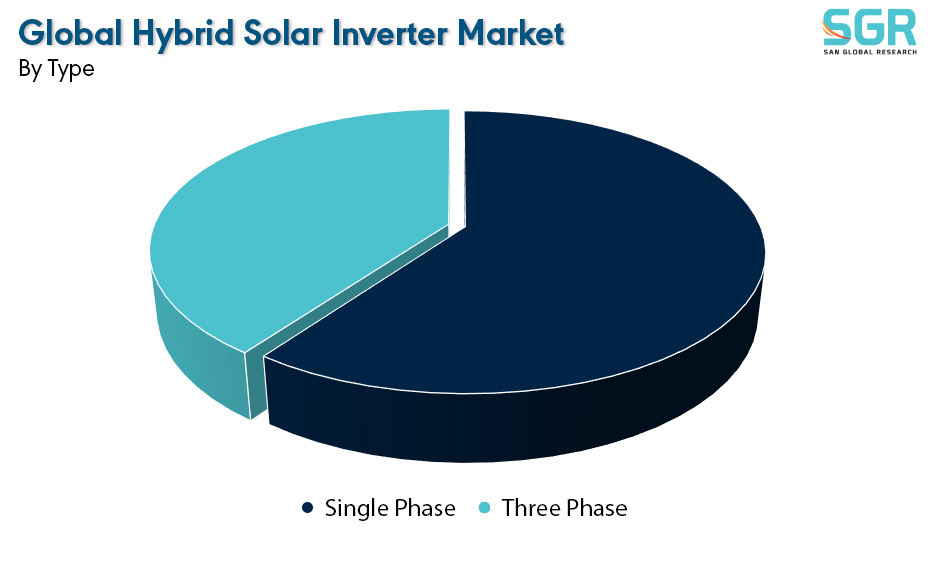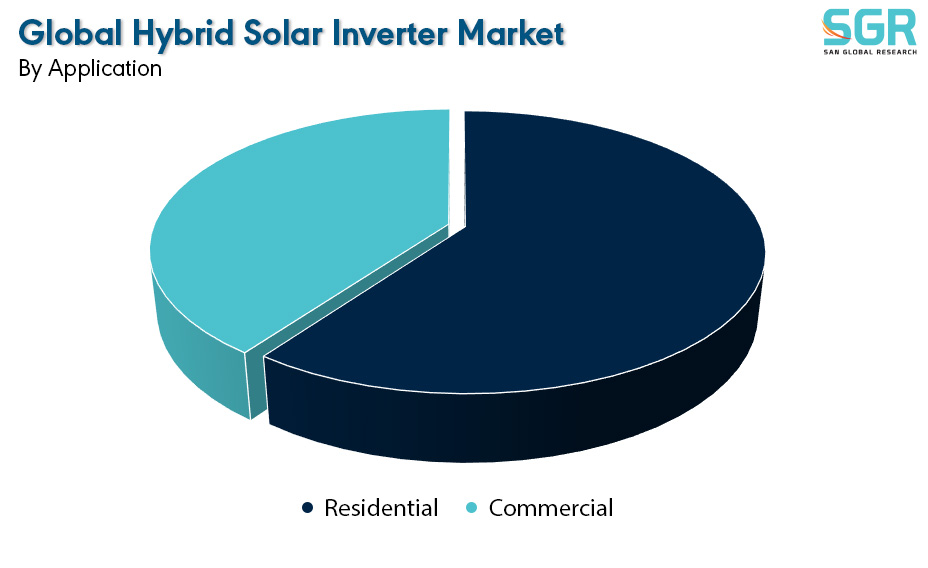Global Hybrid Solar Inverter Market is estimated to be worth USD 7.2 Billion in 2022 and is projected to grow at a CAGR of 13.4% between 2023 to 2032. The study has considered the base year as 2022, which estimates the market size of market and the forecast period is 2023 to 2032. The report analyzes and forecasts the market size, in terms of value (USD Billion), for the market. The report segments the market and forecasts it by Type, by Application and by region/country.

The global hybrid solar inverters market is at the forefront of the renewable energy revolution, providing a crucial link in the integration of solar power into residential and commercial energy systems. Hybrid solar inverters play a pivotal role by efficiently managing both solar-generated electricity and electricity from the grid or energy storage systems. This integration allows users to optimize energy consumption, reduce reliance on the grid, and enhance energy resilience. The market has witnessed substantial growth driven by increasing awareness of environmental sustainability, government incentives, and the growing demand for reliable and continuous power supply. Technological advancements, such as hybrid inverters with energy storage capabilities and smart grid connectivity, contribute to the market's dynamism. As the world transitions towards cleaner and more resilient energy solutions, the global hybrid solar inverters market is poised for continued expansion, offering versatile and efficient solutions for a sustainable energy future.
.jpg)
Region wise Comparison:
The hybrid solar inverters market in North America is experiencing significant growth as the region increasingly embraces renewable energy solutions. Government incentives and tax credits for solar installations, coupled with a rising focus on energy independence, drive the demand for hybrid solar inverters. Advancements in energy storage technologies and smart grid solutions further contribute to the market's expansion.
Europe is a key player in the global hybrid solar inverters market, characterized by a strong commitment to sustainable energy practices. The region's push towards renewable energy integration, coupled with supportive policies and net metering schemes, propels the adoption of hybrid solar inverters. Technological innovations, including the incorporation of artificial intelligence and energy management systems, contribute to the efficiency of solar power integration.
.jpg)
The Asia Pacific region stands as a major contributor to the growth of the global hybrid solar inverters market. Rapid urbanization, coupled with increasing electricity demand, drives the adoption of hybrid solar solutions in countries like China, India, and Australia. Government initiatives and favorable regulatory frameworks supporting renewable energy projects provide impetus to the market.
Latin America is witnessing a growing interest in hybrid solar inverters as countries in the region prioritize clean energy alternatives. Solar-rich nations such as Brazil and Mexico are leveraging hybrid solutions to enhance energy efficiency and grid resilience. Government incentives and a focus on reducing carbon emissions contribute to the market's growth.
The hybrid solar inverters market in Africa and the Middle East is gaining momentum in line with the region's increasing focus on renewable energy development. Solar projects, often integrated with energy storage solutions, address challenges related to power reliability. Government initiatives, such as the promotion of off-grid and decentralized energy systems, provide a favorable environment for hybrid solar inverters.
.jpg)
Segmentation:
The Global Hybrid Solar Inverter Market is segmented by Type, by Application and by region/country.
By Type:

Based on the type, the Global Hybrid Solar Inverter Market is bifurcated into Single Phase & Three Phase – where Single Phase is dominating and ahead in terms of share.
The single-phase type holds a significant position in the global hybrid solar inverters market, catering primarily to residential and small commercial applications. These inverters are designed to manage smaller-scale solar installations where a single-phase electrical system is prevalent. Single-phase hybrid solar inverters efficiently convert direct current (DC) electricity generated by solar panels into alternating current (AC), enabling seamless integration with the electrical grid and energy storage systems. They play a crucial role in optimizing self-consumption of solar energy and managing grid interactions. While typically employed in smaller setups, advancements in technology have enhanced the capabilities of single-phase hybrid inverters, allowing them to incorporate features such as smart grid connectivity, remote monitoring, and compatibility with energy storage solutions.
By Application:

Based on the Application, the Global Hybrid Solar Inverter Market is bifurcated into Residential & Commercial – where Residential is dominating and ahead in terms of share.
On the basis of region
• North America
• Europe
• Asia Pacific
• South America and
• Middle East and Africa
In 2022, North America is anticipated to dominate the Global Hybrid Solar Inverter Market with market revenue of XX USD Million with a registered CAGR of XX%.
Key Players:
The key market players operating in the Global Hybrid Solar Inverter Market include
• SMA
• Delios
• Zucchetti Centro Sistemi
• KACO New Energy
• Imeon Energy
• SolarEdge
• Sungrow
• Huawei
• Fronius
• GoodWe
Drivers:
Growing sector across the globe
The global hybrid solar inverters market is propelled by a confluence of factors driving the adoption of solar energy solutions across diverse applications. Government initiatives and incentives supporting renewable energy projects, such as tax credits and feed-in tariffs, serve as primary drivers, encouraging both residential and commercial users to invest in hybrid solar systems. The increasing emphasis on environmental sustainability and a growing awareness of the impact of conventional energy sources contribute significantly to the market's growth. Technological advancements in hybrid solar inverters, including energy storage capabilities and smart grid integration, address concerns related to grid reliability and energy resilience, further boosting market demand. Rising electricity costs, coupled with the desire for energy independence, prompt consumers to turn to hybrid solar solutions. As the global energy landscape continues to evolve towards cleaner and more decentralized systems, the drivers propelling the hybrid solar inverters market indicate a transformative shift towards sustainable and efficient energy practices.
Opportunity:
Evolving Market
The global hybrid solar inverters market presents diverse opportunities as the world transitions towards sustainable and resilient energy systems. One significant opportunity lies in the continued growth of solar installations across various sectors, driven by environmental concerns, decreasing solar equipment costs, and favorable government policies promoting renewable energy. The integration of advanced technologies, such as artificial intelligence, into hybrid solar inverters offers opportunities for enhancing energy efficiency and system optimization. Additionally, the increasing demand for energy storage solutions and the potential for combining hybrid inverters with emerging technologies like blockchain for decentralized energy management create avenues for innovation. Collaboration between stakeholders, including solar companies, utilities, and technology providers, can further enhance the integration and performance of hybrid solar systems. The global push towards electrification and the development of smart grids also provide opportunities for hybrid solar inverters to play a pivotal role in the future energy landscape. As the market continues to evolve, stakeholders have the chance to contribute to the advancement of sustainable energy solutions by leveraging these opportunities.
| Report Attribute | Details |
| Market Value in 2022 | 7.2 Billion |
| Forecast in 2032 | 12.6 Billion |
| CAGR | CAGR of 14.2% from 2024 to 2032 |
| Base Year of forecast | 2023 |
| Historical | 2019-2022 |
| Units | Revenue in USD Billion and CAGR from 2023 to 2032 |
| Report Coverage | Revenue forecast, Industry outlook, competitive landscape, growth factors, and trends |
| Segments Scope | By Type, By Application |
| Regions Covered | North America, Europe, Asia Pacific, SA and MEA |
| Key Companies profiled | • SMA • Delios • Zucchetti Centro Sistemi • KACO New Energy • Imeon Energy • SolarEdge • Sungrow • Huawei • Fronius • GoodWe |

 Description
Description
 Table of Content
Table of Content
 Gera Imperium Rise,
Gera Imperium Rise,  +91 9209275355
+91 9209275355


